Quadruple Bottom Line New Zealand Research 2022
VerifiedAdded on 2022/09/18
|15
|3557
|36
AI Summary
Contribute Materials
Your contribution can guide someone’s learning journey. Share your
documents today.
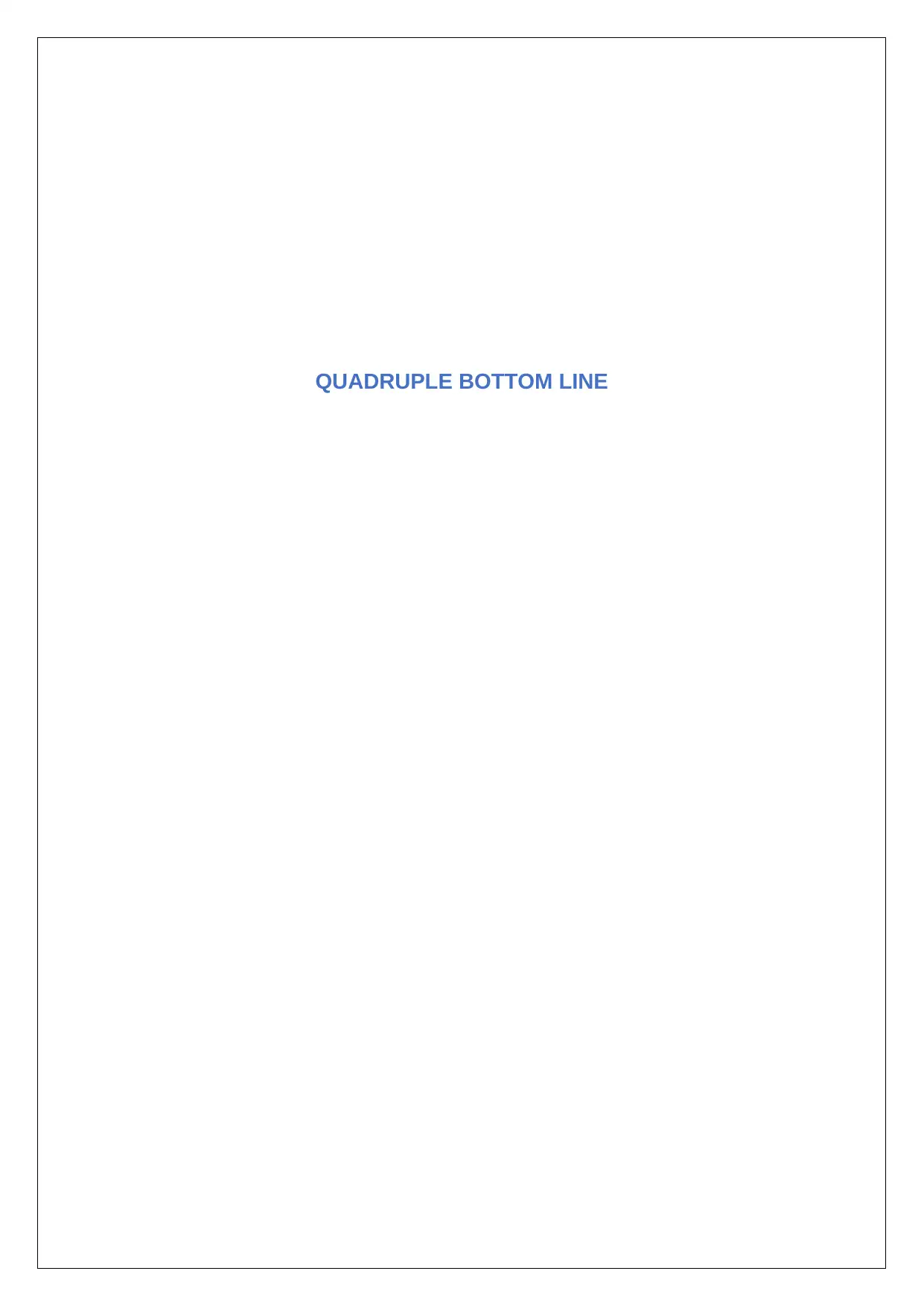
QUADRUPLE BOTTOM LINE
Secure Best Marks with AI Grader
Need help grading? Try our AI Grader for instant feedback on your assignments.
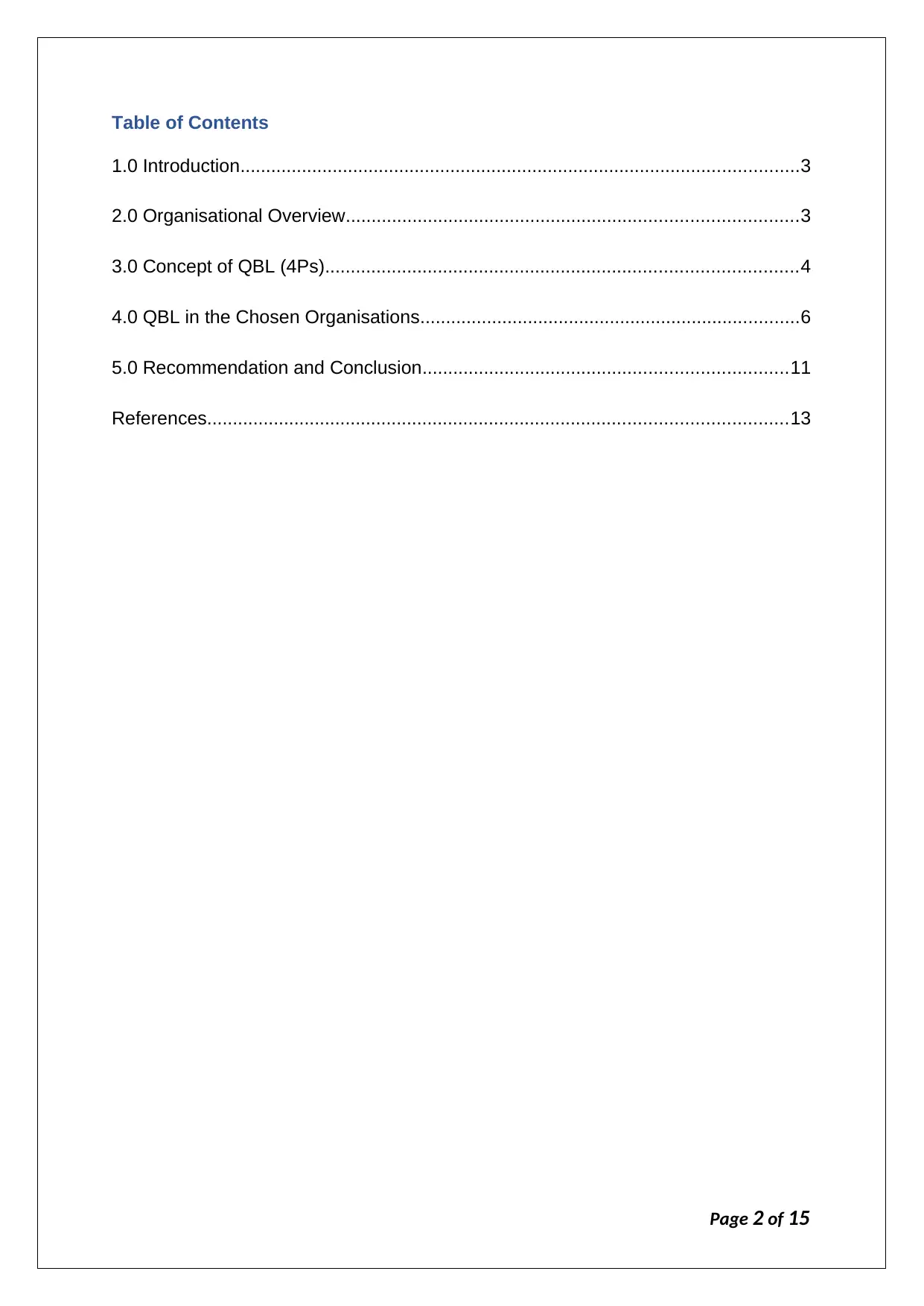
Table of Contents
1.0 Introduction.............................................................................................................3
2.0 Organisational Overview........................................................................................3
3.0 Concept of QBL (4Ps)............................................................................................4
4.0 QBL in the Chosen Organisations..........................................................................6
5.0 Recommendation and Conclusion.......................................................................11
References.................................................................................................................13
Page 2 of 15
1.0 Introduction.............................................................................................................3
2.0 Organisational Overview........................................................................................3
3.0 Concept of QBL (4Ps)............................................................................................4
4.0 QBL in the Chosen Organisations..........................................................................6
5.0 Recommendation and Conclusion.......................................................................11
References.................................................................................................................13
Page 2 of 15
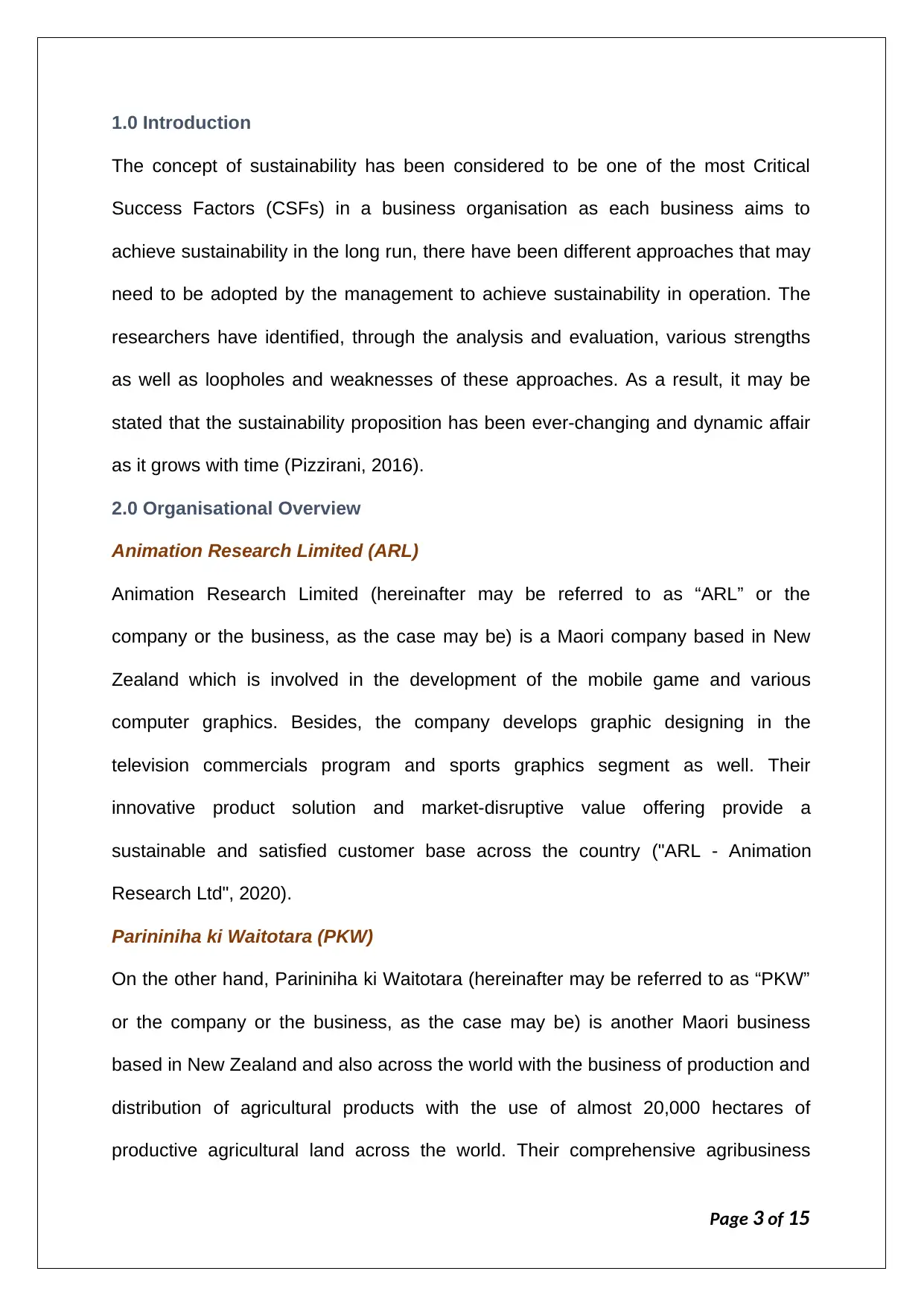
1.0 Introduction
The concept of sustainability has been considered to be one of the most Critical
Success Factors (CSFs) in a business organisation as each business aims to
achieve sustainability in the long run, there have been different approaches that may
need to be adopted by the management to achieve sustainability in operation. The
researchers have identified, through the analysis and evaluation, various strengths
as well as loopholes and weaknesses of these approaches. As a result, it may be
stated that the sustainability proposition has been ever-changing and dynamic affair
as it grows with time (Pizzirani, 2016).
2.0 Organisational Overview
Animation Research Limited (ARL)
Animation Research Limited (hereinafter may be referred to as “ARL” or the
company or the business, as the case may be) is a Maori company based in New
Zealand which is involved in the development of the mobile game and various
computer graphics. Besides, the company develops graphic designing in the
television commercials program and sports graphics segment as well. Their
innovative product solution and market-disruptive value offering provide a
sustainable and satisfied customer base across the country ("ARL - Animation
Research Ltd", 2020).
Parininiha ki Waitotara (PKW)
On the other hand, Parininiha ki Waitotara (hereinafter may be referred to as “PKW”
or the company or the business, as the case may be) is another Maori business
based in New Zealand and also across the world with the business of production and
distribution of agricultural products with the use of almost 20,000 hectares of
productive agricultural land across the world. Their comprehensive agribusiness
Page 3 of 15
The concept of sustainability has been considered to be one of the most Critical
Success Factors (CSFs) in a business organisation as each business aims to
achieve sustainability in the long run, there have been different approaches that may
need to be adopted by the management to achieve sustainability in operation. The
researchers have identified, through the analysis and evaluation, various strengths
as well as loopholes and weaknesses of these approaches. As a result, it may be
stated that the sustainability proposition has been ever-changing and dynamic affair
as it grows with time (Pizzirani, 2016).
2.0 Organisational Overview
Animation Research Limited (ARL)
Animation Research Limited (hereinafter may be referred to as “ARL” or the
company or the business, as the case may be) is a Maori company based in New
Zealand which is involved in the development of the mobile game and various
computer graphics. Besides, the company develops graphic designing in the
television commercials program and sports graphics segment as well. Their
innovative product solution and market-disruptive value offering provide a
sustainable and satisfied customer base across the country ("ARL - Animation
Research Ltd", 2020).
Parininiha ki Waitotara (PKW)
On the other hand, Parininiha ki Waitotara (hereinafter may be referred to as “PKW”
or the company or the business, as the case may be) is another Maori business
based in New Zealand and also across the world with the business of production and
distribution of agricultural products with the use of almost 20,000 hectares of
productive agricultural land across the world. Their comprehensive agribusiness
Page 3 of 15
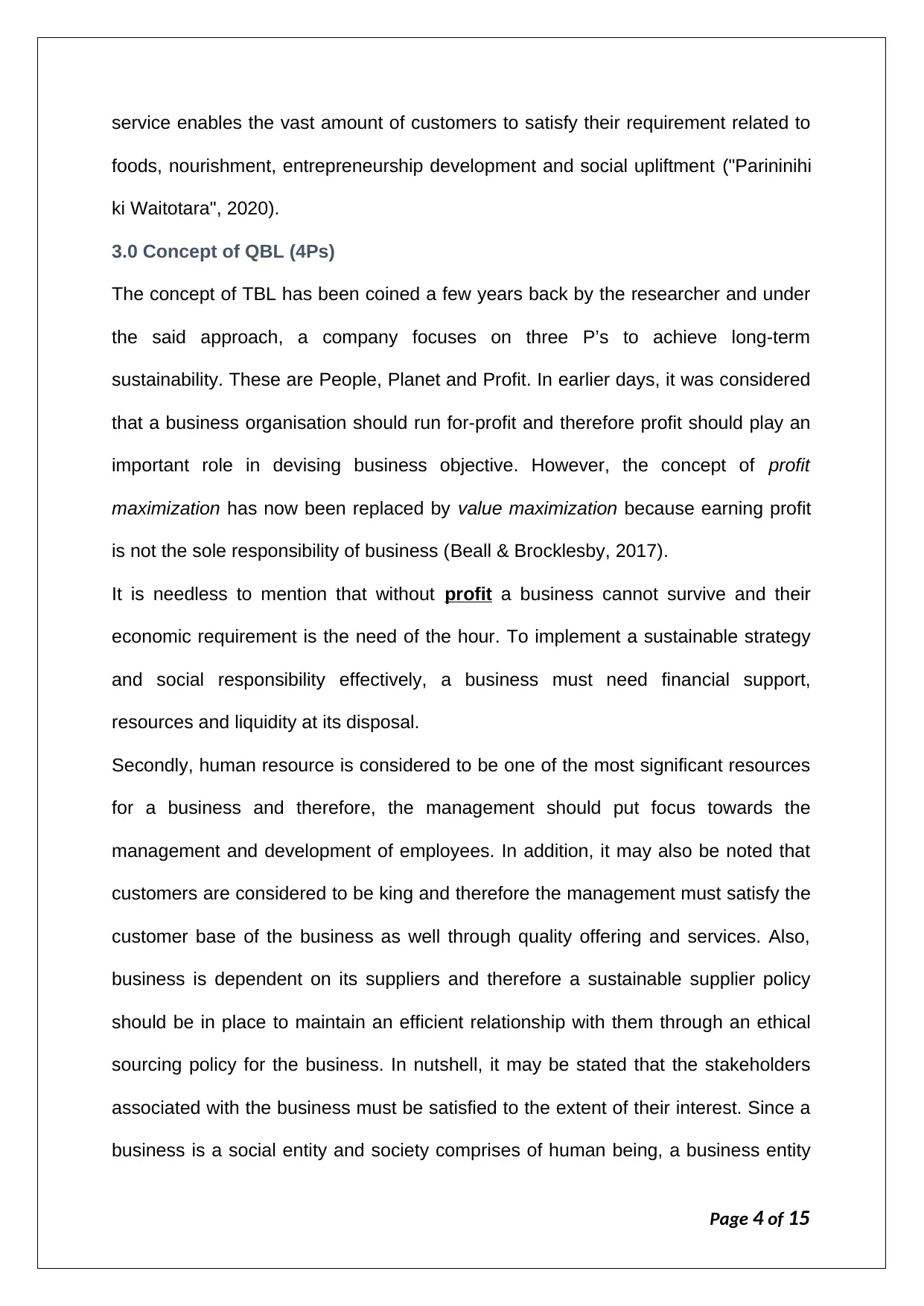
service enables the vast amount of customers to satisfy their requirement related to
foods, nourishment, entrepreneurship development and social upliftment ("Parininihi
ki Waitotara", 2020).
3.0 Concept of QBL (4Ps)
The concept of TBL has been coined a few years back by the researcher and under
the said approach, a company focuses on three P’s to achieve long-term
sustainability. These are People, Planet and Profit. In earlier days, it was considered
that a business organisation should run for-profit and therefore profit should play an
important role in devising business objective. However, the concept of profit
maximization has now been replaced by value maximization because earning profit
is not the sole responsibility of business (Beall & Brocklesby, 2017).
It is needless to mention that without profit a business cannot survive and their
economic requirement is the need of the hour. To implement a sustainable strategy
and social responsibility effectively, a business must need financial support,
resources and liquidity at its disposal.
Secondly, human resource is considered to be one of the most significant resources
for a business and therefore, the management should put focus towards the
management and development of employees. In addition, it may also be noted that
customers are considered to be king and therefore the management must satisfy the
customer base of the business as well through quality offering and services. Also,
business is dependent on its suppliers and therefore a sustainable supplier policy
should be in place to maintain an efficient relationship with them through an ethical
sourcing policy for the business. In nutshell, it may be stated that the stakeholders
associated with the business must be satisfied to the extent of their interest. Since a
business is a social entity and society comprises of human being, a business entity
Page 4 of 15
foods, nourishment, entrepreneurship development and social upliftment ("Parininihi
ki Waitotara", 2020).
3.0 Concept of QBL (4Ps)
The concept of TBL has been coined a few years back by the researcher and under
the said approach, a company focuses on three P’s to achieve long-term
sustainability. These are People, Planet and Profit. In earlier days, it was considered
that a business organisation should run for-profit and therefore profit should play an
important role in devising business objective. However, the concept of profit
maximization has now been replaced by value maximization because earning profit
is not the sole responsibility of business (Beall & Brocklesby, 2017).
It is needless to mention that without profit a business cannot survive and their
economic requirement is the need of the hour. To implement a sustainable strategy
and social responsibility effectively, a business must need financial support,
resources and liquidity at its disposal.
Secondly, human resource is considered to be one of the most significant resources
for a business and therefore, the management should put focus towards the
management and development of employees. In addition, it may also be noted that
customers are considered to be king and therefore the management must satisfy the
customer base of the business as well through quality offering and services. Also,
business is dependent on its suppliers and therefore a sustainable supplier policy
should be in place to maintain an efficient relationship with them through an ethical
sourcing policy for the business. In nutshell, it may be stated that the stakeholders
associated with the business must be satisfied to the extent of their interest. Since a
business is a social entity and society comprises of human being, a business entity
Page 4 of 15
Secure Best Marks with AI Grader
Need help grading? Try our AI Grader for instant feedback on your assignments.
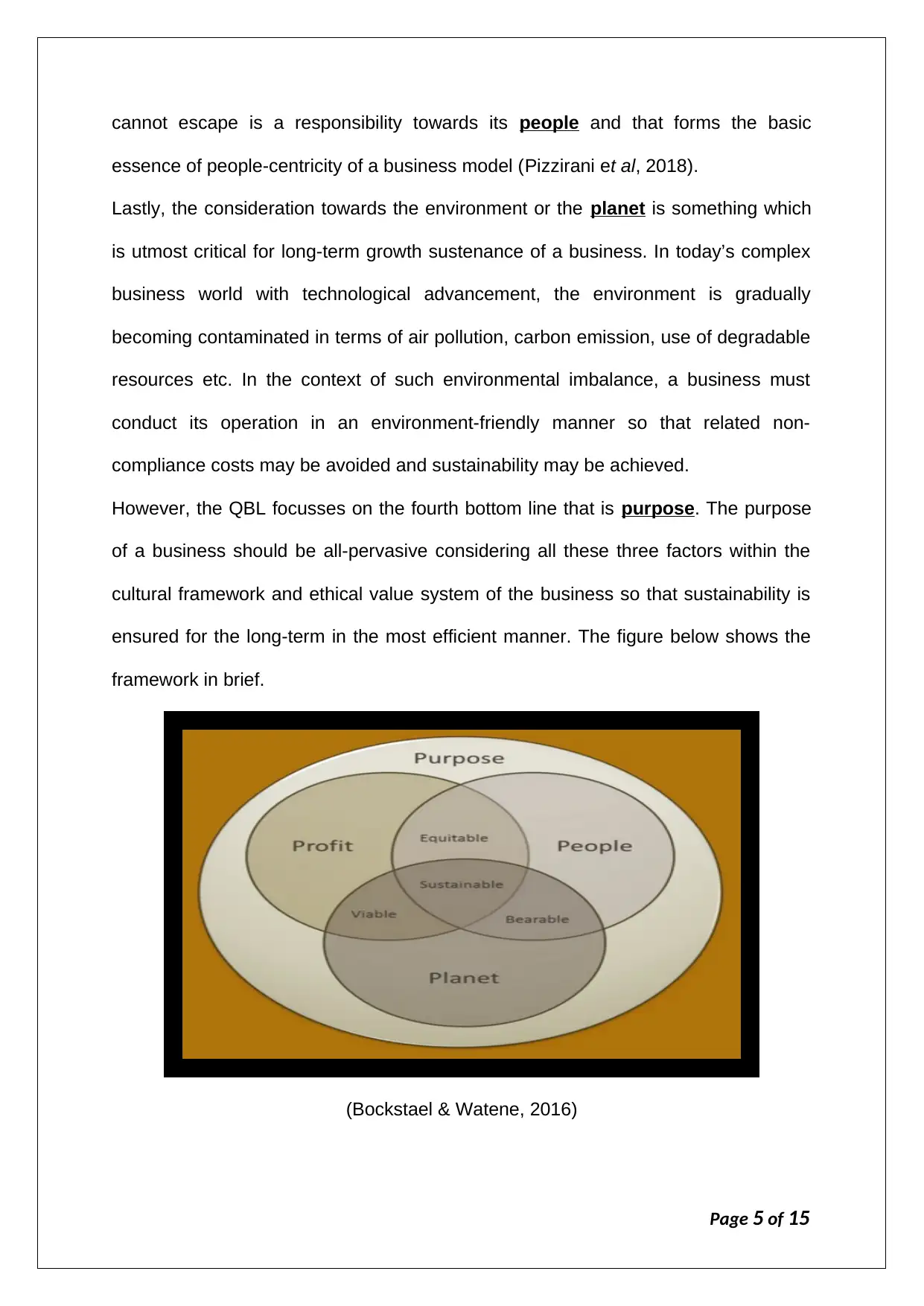
cannot escape is a responsibility towards its people and that forms the basic
essence of people-centricity of a business model (Pizzirani et al, 2018).
Lastly, the consideration towards the environment or the planet is something which
is utmost critical for long-term growth sustenance of a business. In today’s complex
business world with technological advancement, the environment is gradually
becoming contaminated in terms of air pollution, carbon emission, use of degradable
resources etc. In the context of such environmental imbalance, a business must
conduct its operation in an environment-friendly manner so that related non-
compliance costs may be avoided and sustainability may be achieved.
However, the QBL focusses on the fourth bottom line that is purpose. The purpose
of a business should be all-pervasive considering all these three factors within the
cultural framework and ethical value system of the business so that sustainability is
ensured for the long-term in the most efficient manner. The figure below shows the
framework in brief.
(Bockstael & Watene, 2016)
Page 5 of 15
essence of people-centricity of a business model (Pizzirani et al, 2018).
Lastly, the consideration towards the environment or the planet is something which
is utmost critical for long-term growth sustenance of a business. In today’s complex
business world with technological advancement, the environment is gradually
becoming contaminated in terms of air pollution, carbon emission, use of degradable
resources etc. In the context of such environmental imbalance, a business must
conduct its operation in an environment-friendly manner so that related non-
compliance costs may be avoided and sustainability may be achieved.
However, the QBL focusses on the fourth bottom line that is purpose. The purpose
of a business should be all-pervasive considering all these three factors within the
cultural framework and ethical value system of the business so that sustainability is
ensured for the long-term in the most efficient manner. The figure below shows the
framework in brief.
(Bockstael & Watene, 2016)
Page 5 of 15
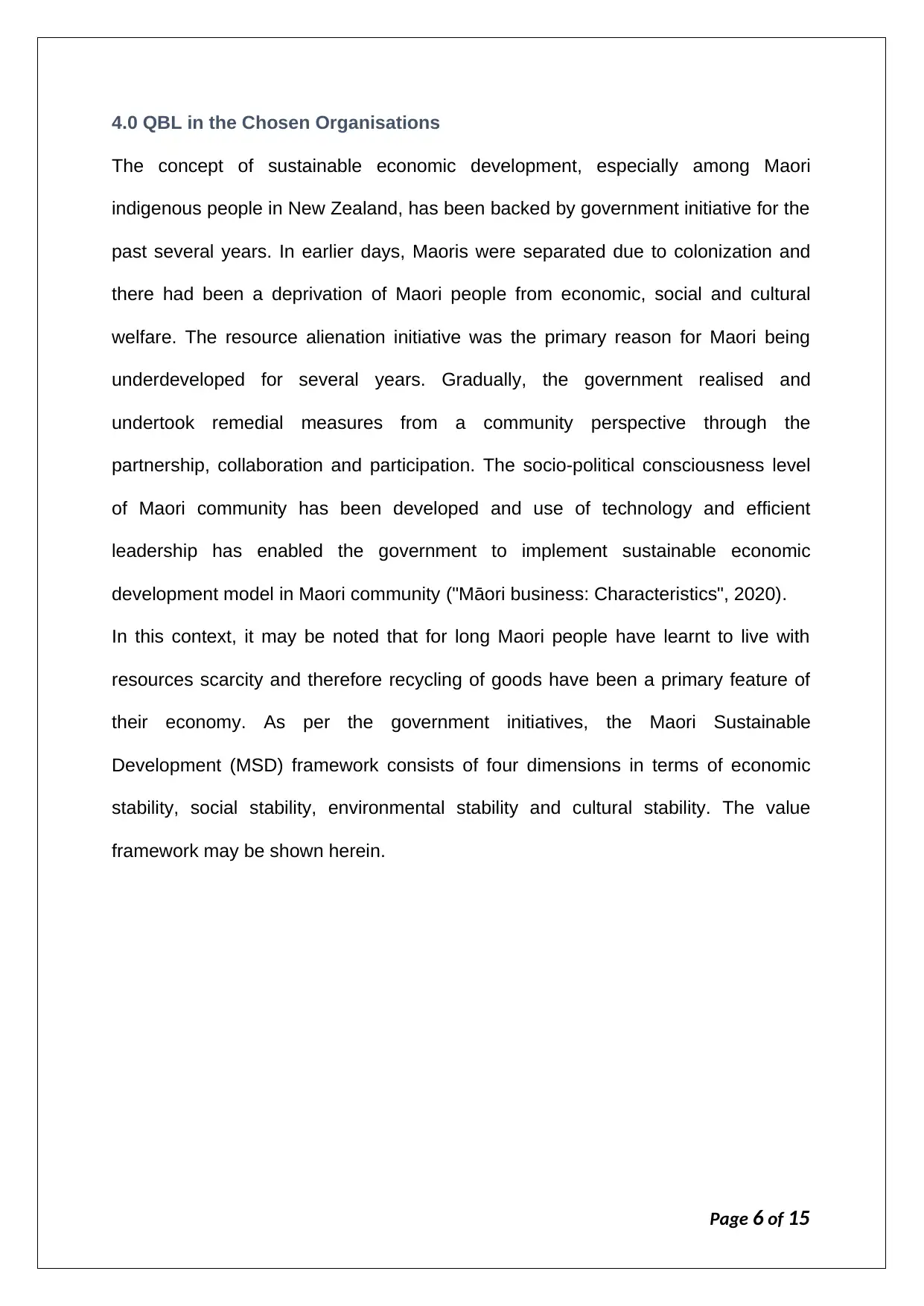
4.0 QBL in the Chosen Organisations
The concept of sustainable economic development, especially among Maori
indigenous people in New Zealand, has been backed by government initiative for the
past several years. In earlier days, Maoris were separated due to colonization and
there had been a deprivation of Maori people from economic, social and cultural
welfare. The resource alienation initiative was the primary reason for Maori being
underdeveloped for several years. Gradually, the government realised and
undertook remedial measures from a community perspective through the
partnership, collaboration and participation. The socio-political consciousness level
of Maori community has been developed and use of technology and efficient
leadership has enabled the government to implement sustainable economic
development model in Maori community ("Māori business: Characteristics", 2020).
In this context, it may be noted that for long Maori people have learnt to live with
resources scarcity and therefore recycling of goods have been a primary feature of
their economy. As per the government initiatives, the Maori Sustainable
Development (MSD) framework consists of four dimensions in terms of economic
stability, social stability, environmental stability and cultural stability. The value
framework may be shown herein.
Page 6 of 15
The concept of sustainable economic development, especially among Maori
indigenous people in New Zealand, has been backed by government initiative for the
past several years. In earlier days, Maoris were separated due to colonization and
there had been a deprivation of Maori people from economic, social and cultural
welfare. The resource alienation initiative was the primary reason for Maori being
underdeveloped for several years. Gradually, the government realised and
undertook remedial measures from a community perspective through the
partnership, collaboration and participation. The socio-political consciousness level
of Maori community has been developed and use of technology and efficient
leadership has enabled the government to implement sustainable economic
development model in Maori community ("Māori business: Characteristics", 2020).
In this context, it may be noted that for long Maori people have learnt to live with
resources scarcity and therefore recycling of goods have been a primary feature of
their economy. As per the government initiatives, the Maori Sustainable
Development (MSD) framework consists of four dimensions in terms of economic
stability, social stability, environmental stability and cultural stability. The value
framework may be shown herein.
Page 6 of 15
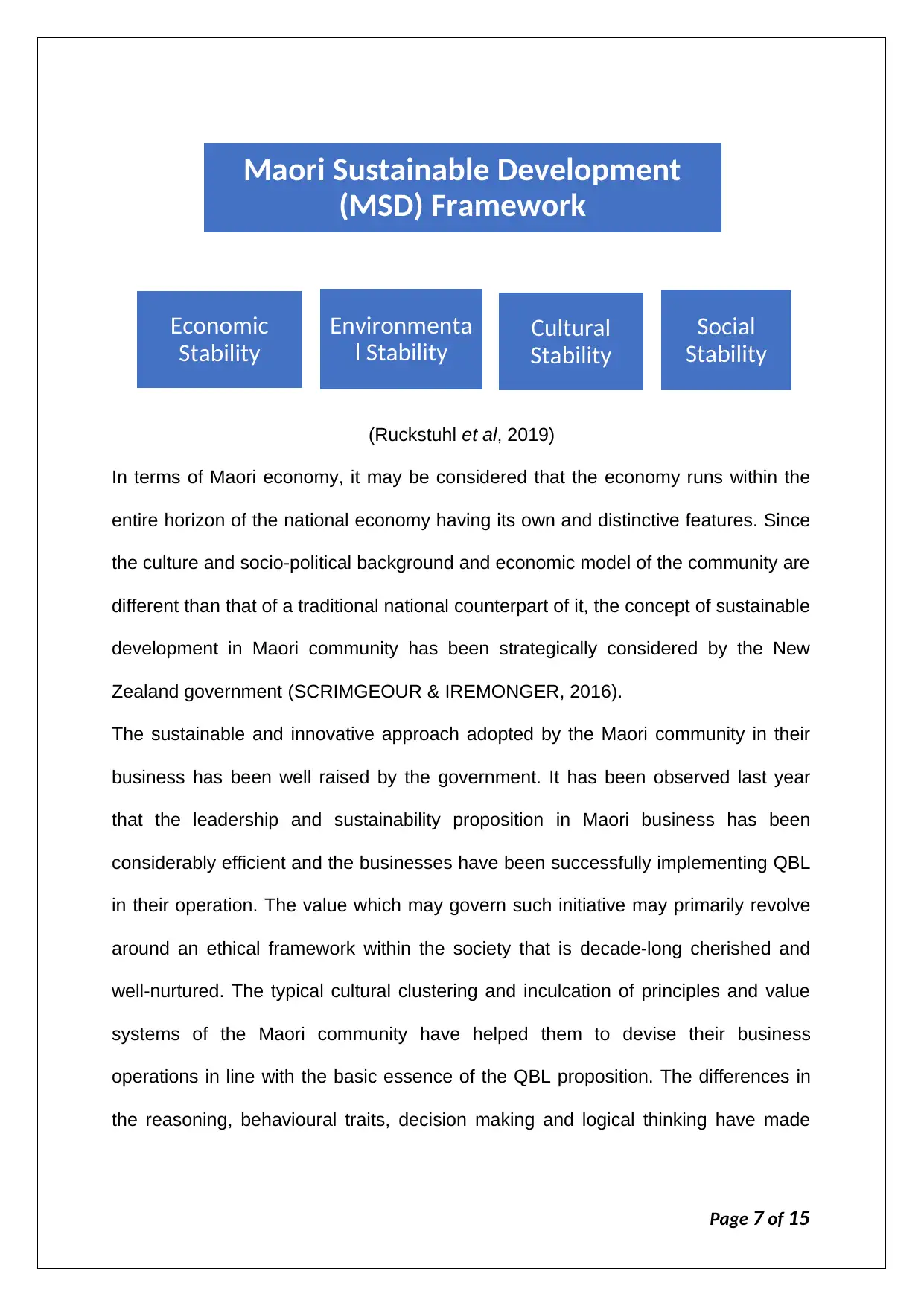
(Ruckstuhl et al, 2019)
In terms of Maori economy, it may be considered that the economy runs within the
entire horizon of the national economy having its own and distinctive features. Since
the culture and socio-political background and economic model of the community are
different than that of a traditional national counterpart of it, the concept of sustainable
development in Maori community has been strategically considered by the New
Zealand government (SCRIMGEOUR & IREMONGER, 2016).
The sustainable and innovative approach adopted by the Maori community in their
business has been well raised by the government. It has been observed last year
that the leadership and sustainability proposition in Maori business has been
considerably efficient and the businesses have been successfully implementing QBL
in their operation. The value which may govern such initiative may primarily revolve
around an ethical framework within the society that is decade-long cherished and
well-nurtured. The typical cultural clustering and inculcation of principles and value
systems of the Maori community have helped them to devise their business
operations in line with the basic essence of the QBL proposition. The differences in
the reasoning, behavioural traits, decision making and logical thinking have made
Page 7 of 15
Economic
Stability
Cultural
Stability
Environmenta
l Stability
Maori Sustainable Development
(MSD) Framework
Social
Stability
In terms of Maori economy, it may be considered that the economy runs within the
entire horizon of the national economy having its own and distinctive features. Since
the culture and socio-political background and economic model of the community are
different than that of a traditional national counterpart of it, the concept of sustainable
development in Maori community has been strategically considered by the New
Zealand government (SCRIMGEOUR & IREMONGER, 2016).
The sustainable and innovative approach adopted by the Maori community in their
business has been well raised by the government. It has been observed last year
that the leadership and sustainability proposition in Maori business has been
considerably efficient and the businesses have been successfully implementing QBL
in their operation. The value which may govern such initiative may primarily revolve
around an ethical framework within the society that is decade-long cherished and
well-nurtured. The typical cultural clustering and inculcation of principles and value
systems of the Maori community have helped them to devise their business
operations in line with the basic essence of the QBL proposition. The differences in
the reasoning, behavioural traits, decision making and logical thinking have made
Page 7 of 15
Economic
Stability
Cultural
Stability
Environmenta
l Stability
Maori Sustainable Development
(MSD) Framework
Social
Stability
Paraphrase This Document
Need a fresh take? Get an instant paraphrase of this document with our AI Paraphraser
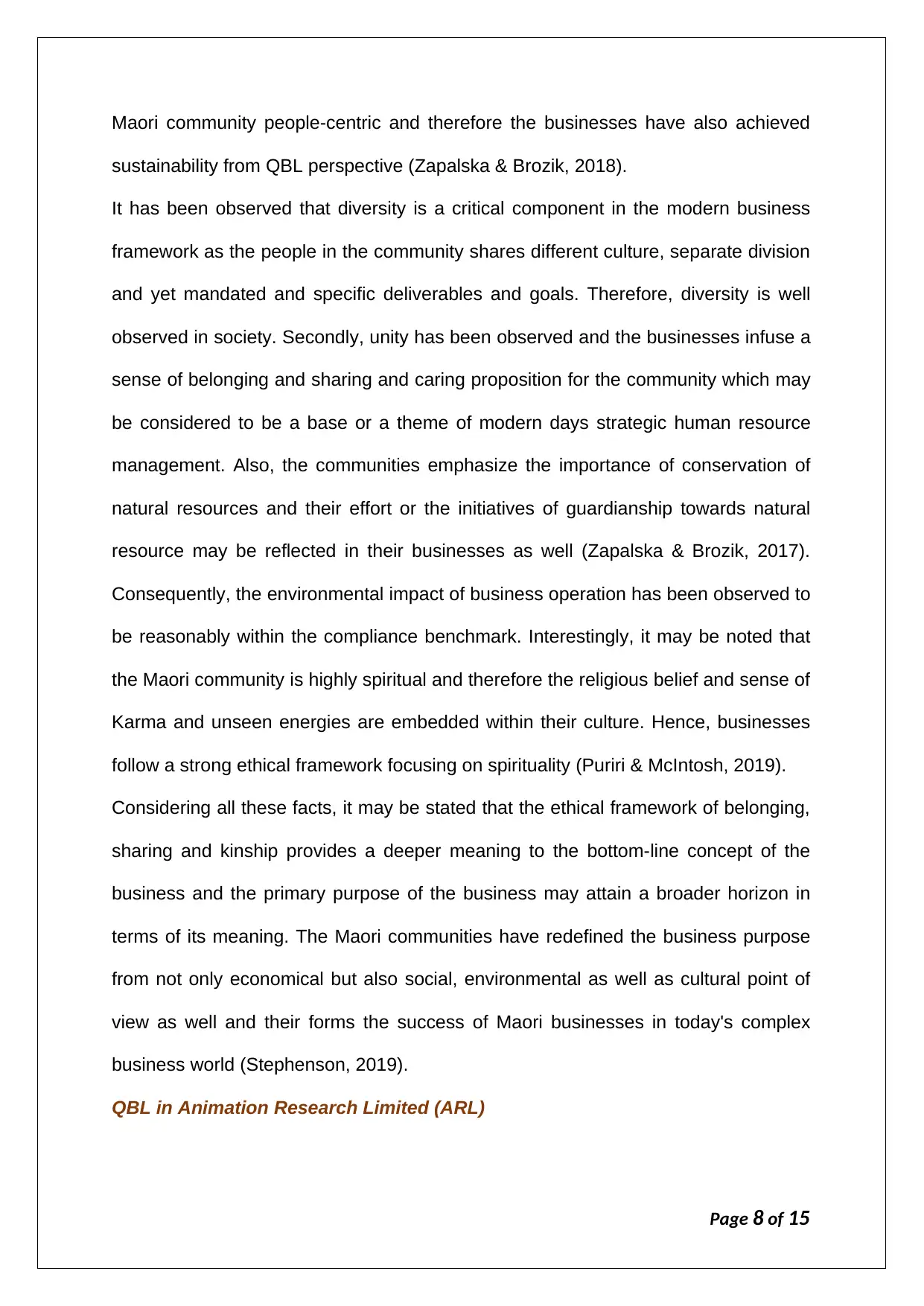
Maori community people-centric and therefore the businesses have also achieved
sustainability from QBL perspective (Zapalska & Brozik, 2018).
It has been observed that diversity is a critical component in the modern business
framework as the people in the community shares different culture, separate division
and yet mandated and specific deliverables and goals. Therefore, diversity is well
observed in society. Secondly, unity has been observed and the businesses infuse a
sense of belonging and sharing and caring proposition for the community which may
be considered to be a base or a theme of modern days strategic human resource
management. Also, the communities emphasize the importance of conservation of
natural resources and their effort or the initiatives of guardianship towards natural
resource may be reflected in their businesses as well (Zapalska & Brozik, 2017).
Consequently, the environmental impact of business operation has been observed to
be reasonably within the compliance benchmark. Interestingly, it may be noted that
the Maori community is highly spiritual and therefore the religious belief and sense of
Karma and unseen energies are embedded within their culture. Hence, businesses
follow a strong ethical framework focusing on spirituality (Puriri & McIntosh, 2019).
Considering all these facts, it may be stated that the ethical framework of belonging,
sharing and kinship provides a deeper meaning to the bottom-line concept of the
business and the primary purpose of the business may attain a broader horizon in
terms of its meaning. The Maori communities have redefined the business purpose
from not only economical but also social, environmental as well as cultural point of
view as well and their forms the success of Maori businesses in today's complex
business world (Stephenson, 2019).
QBL in Animation Research Limited (ARL)
Page 8 of 15
sustainability from QBL perspective (Zapalska & Brozik, 2018).
It has been observed that diversity is a critical component in the modern business
framework as the people in the community shares different culture, separate division
and yet mandated and specific deliverables and goals. Therefore, diversity is well
observed in society. Secondly, unity has been observed and the businesses infuse a
sense of belonging and sharing and caring proposition for the community which may
be considered to be a base or a theme of modern days strategic human resource
management. Also, the communities emphasize the importance of conservation of
natural resources and their effort or the initiatives of guardianship towards natural
resource may be reflected in their businesses as well (Zapalska & Brozik, 2017).
Consequently, the environmental impact of business operation has been observed to
be reasonably within the compliance benchmark. Interestingly, it may be noted that
the Maori community is highly spiritual and therefore the religious belief and sense of
Karma and unseen energies are embedded within their culture. Hence, businesses
follow a strong ethical framework focusing on spirituality (Puriri & McIntosh, 2019).
Considering all these facts, it may be stated that the ethical framework of belonging,
sharing and kinship provides a deeper meaning to the bottom-line concept of the
business and the primary purpose of the business may attain a broader horizon in
terms of its meaning. The Maori communities have redefined the business purpose
from not only economical but also social, environmental as well as cultural point of
view as well and their forms the success of Maori businesses in today's complex
business world (Stephenson, 2019).
QBL in Animation Research Limited (ARL)
Page 8 of 15
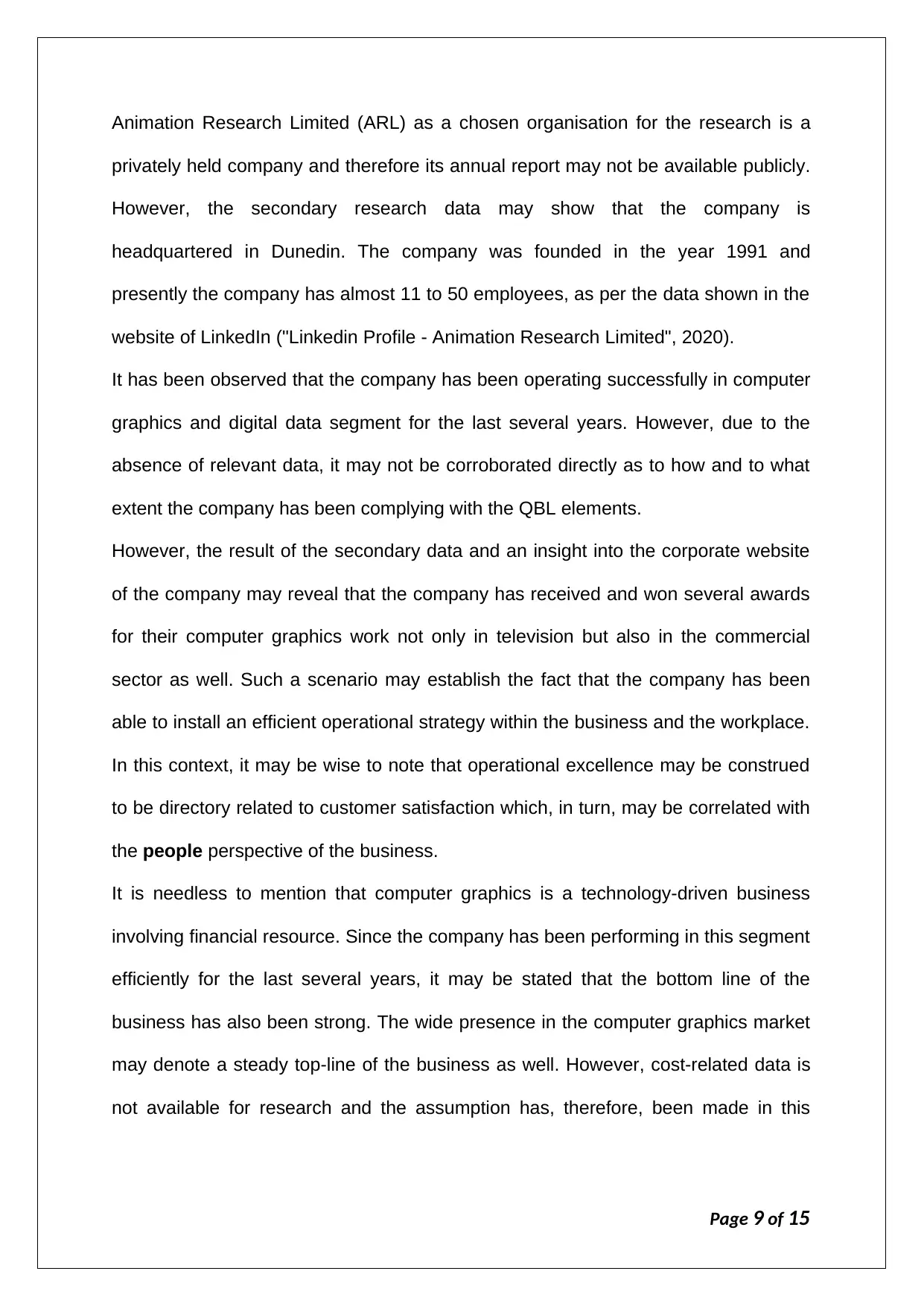
Animation Research Limited (ARL) as a chosen organisation for the research is a
privately held company and therefore its annual report may not be available publicly.
However, the secondary research data may show that the company is
headquartered in Dunedin. The company was founded in the year 1991 and
presently the company has almost 11 to 50 employees, as per the data shown in the
website of LinkedIn ("Linkedin Profile - Animation Research Limited", 2020).
It has been observed that the company has been operating successfully in computer
graphics and digital data segment for the last several years. However, due to the
absence of relevant data, it may not be corroborated directly as to how and to what
extent the company has been complying with the QBL elements.
However, the result of the secondary data and an insight into the corporate website
of the company may reveal that the company has received and won several awards
for their computer graphics work not only in television but also in the commercial
sector as well. Such a scenario may establish the fact that the company has been
able to install an efficient operational strategy within the business and the workplace.
In this context, it may be wise to note that operational excellence may be construed
to be directory related to customer satisfaction which, in turn, may be correlated with
the people perspective of the business.
It is needless to mention that computer graphics is a technology-driven business
involving financial resource. Since the company has been performing in this segment
efficiently for the last several years, it may be stated that the bottom line of the
business has also been strong. The wide presence in the computer graphics market
may denote a steady top-line of the business as well. However, cost-related data is
not available for research and the assumption has, therefore, been made in this
Page 9 of 15
privately held company and therefore its annual report may not be available publicly.
However, the secondary research data may show that the company is
headquartered in Dunedin. The company was founded in the year 1991 and
presently the company has almost 11 to 50 employees, as per the data shown in the
website of LinkedIn ("Linkedin Profile - Animation Research Limited", 2020).
It has been observed that the company has been operating successfully in computer
graphics and digital data segment for the last several years. However, due to the
absence of relevant data, it may not be corroborated directly as to how and to what
extent the company has been complying with the QBL elements.
However, the result of the secondary data and an insight into the corporate website
of the company may reveal that the company has received and won several awards
for their computer graphics work not only in television but also in the commercial
sector as well. Such a scenario may establish the fact that the company has been
able to install an efficient operational strategy within the business and the workplace.
In this context, it may be wise to note that operational excellence may be construed
to be directory related to customer satisfaction which, in turn, may be correlated with
the people perspective of the business.
It is needless to mention that computer graphics is a technology-driven business
involving financial resource. Since the company has been performing in this segment
efficiently for the last several years, it may be stated that the bottom line of the
business has also been strong. The wide presence in the computer graphics market
may denote a steady top-line of the business as well. However, cost-related data is
not available for research and the assumption has, therefore, been made in this
Page 9 of 15
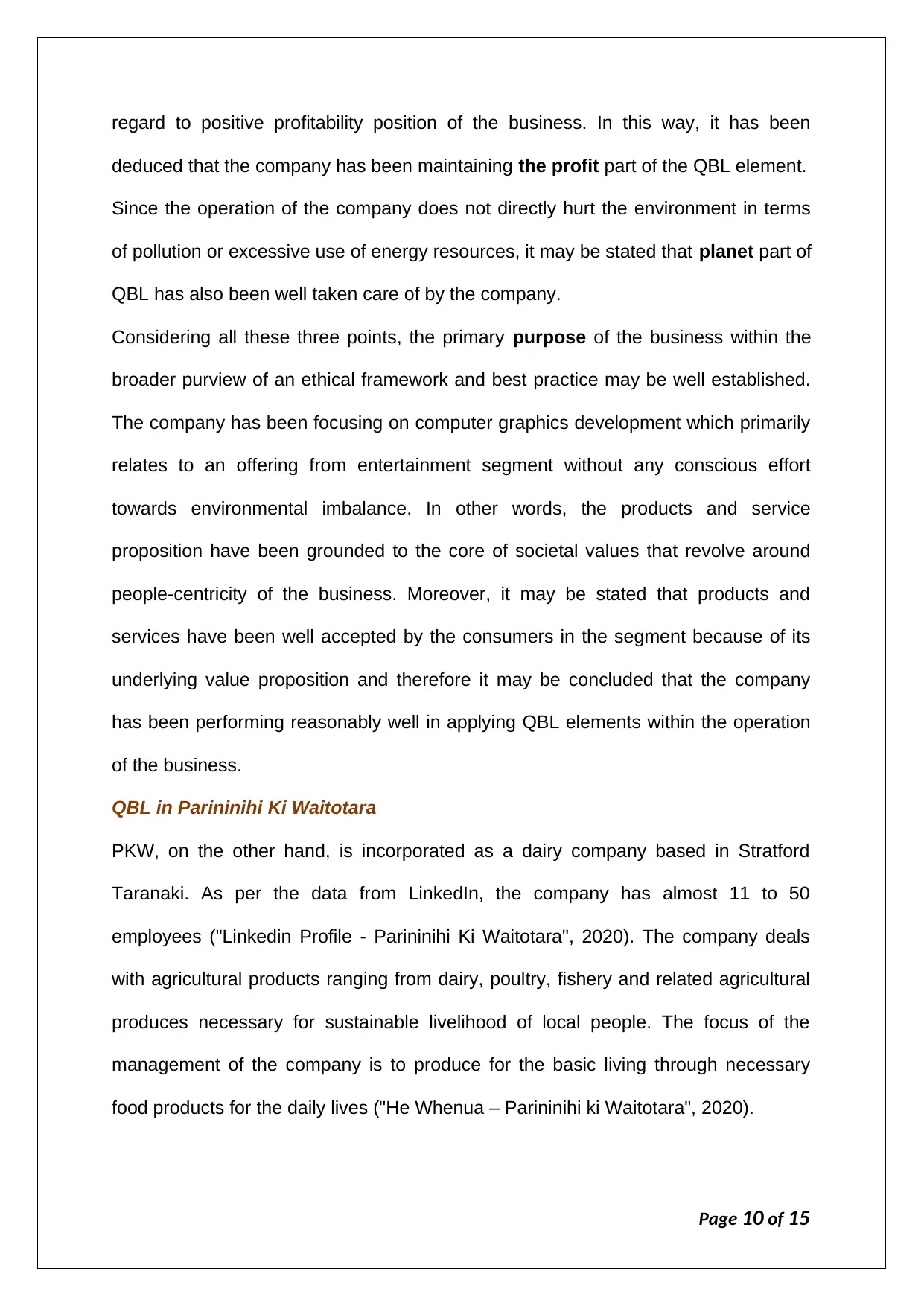
regard to positive profitability position of the business. In this way, it has been
deduced that the company has been maintaining the profit part of the QBL element.
Since the operation of the company does not directly hurt the environment in terms
of pollution or excessive use of energy resources, it may be stated that planet part of
QBL has also been well taken care of by the company.
Considering all these three points, the primary purpose of the business within the
broader purview of an ethical framework and best practice may be well established.
The company has been focusing on computer graphics development which primarily
relates to an offering from entertainment segment without any conscious effort
towards environmental imbalance. In other words, the products and service
proposition have been grounded to the core of societal values that revolve around
people-centricity of the business. Moreover, it may be stated that products and
services have been well accepted by the consumers in the segment because of its
underlying value proposition and therefore it may be concluded that the company
has been performing reasonably well in applying QBL elements within the operation
of the business.
QBL in Parininihi Ki Waitotara
PKW, on the other hand, is incorporated as a dairy company based in Stratford
Taranaki. As per the data from LinkedIn, the company has almost 11 to 50
employees ("Linkedin Profile - Parininihi Ki Waitotara", 2020). The company deals
with agricultural products ranging from dairy, poultry, fishery and related agricultural
produces necessary for sustainable livelihood of local people. The focus of the
management of the company is to produce for the basic living through necessary
food products for the daily lives ("He Whenua – Parininihi ki Waitotara", 2020).
Page 10 of 15
deduced that the company has been maintaining the profit part of the QBL element.
Since the operation of the company does not directly hurt the environment in terms
of pollution or excessive use of energy resources, it may be stated that planet part of
QBL has also been well taken care of by the company.
Considering all these three points, the primary purpose of the business within the
broader purview of an ethical framework and best practice may be well established.
The company has been focusing on computer graphics development which primarily
relates to an offering from entertainment segment without any conscious effort
towards environmental imbalance. In other words, the products and service
proposition have been grounded to the core of societal values that revolve around
people-centricity of the business. Moreover, it may be stated that products and
services have been well accepted by the consumers in the segment because of its
underlying value proposition and therefore it may be concluded that the company
has been performing reasonably well in applying QBL elements within the operation
of the business.
QBL in Parininihi Ki Waitotara
PKW, on the other hand, is incorporated as a dairy company based in Stratford
Taranaki. As per the data from LinkedIn, the company has almost 11 to 50
employees ("Linkedin Profile - Parininihi Ki Waitotara", 2020). The company deals
with agricultural products ranging from dairy, poultry, fishery and related agricultural
produces necessary for sustainable livelihood of local people. The focus of the
management of the company is to produce for the basic living through necessary
food products for the daily lives ("He Whenua – Parininihi ki Waitotara", 2020).
Page 10 of 15
Secure Best Marks with AI Grader
Need help grading? Try our AI Grader for instant feedback on your assignments.
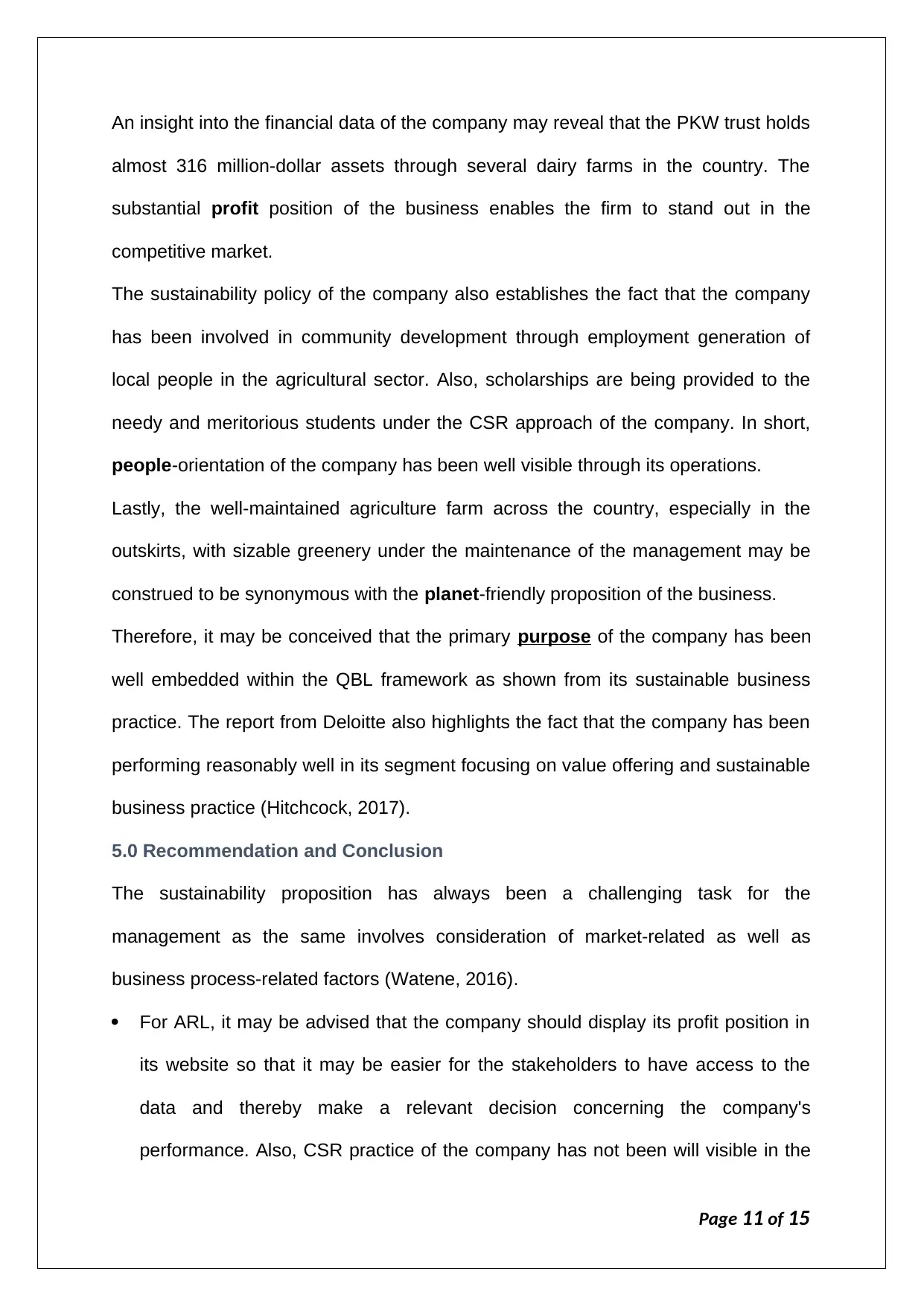
An insight into the financial data of the company may reveal that the PKW trust holds
almost 316 million-dollar assets through several dairy farms in the country. The
substantial profit position of the business enables the firm to stand out in the
competitive market.
The sustainability policy of the company also establishes the fact that the company
has been involved in community development through employment generation of
local people in the agricultural sector. Also, scholarships are being provided to the
needy and meritorious students under the CSR approach of the company. In short,
people-orientation of the company has been well visible through its operations.
Lastly, the well-maintained agriculture farm across the country, especially in the
outskirts, with sizable greenery under the maintenance of the management may be
construed to be synonymous with the planet-friendly proposition of the business.
Therefore, it may be conceived that the primary purpose of the company has been
well embedded within the QBL framework as shown from its sustainable business
practice. The report from Deloitte also highlights the fact that the company has been
performing reasonably well in its segment focusing on value offering and sustainable
business practice (Hitchcock, 2017).
5.0 Recommendation and Conclusion
The sustainability proposition has always been a challenging task for the
management as the same involves consideration of market-related as well as
business process-related factors (Watene, 2016).
For ARL, it may be advised that the company should display its profit position in
its website so that it may be easier for the stakeholders to have access to the
data and thereby make a relevant decision concerning the company's
performance. Also, CSR practice of the company has not been will visible in the
Page 11 of 15
almost 316 million-dollar assets through several dairy farms in the country. The
substantial profit position of the business enables the firm to stand out in the
competitive market.
The sustainability policy of the company also establishes the fact that the company
has been involved in community development through employment generation of
local people in the agricultural sector. Also, scholarships are being provided to the
needy and meritorious students under the CSR approach of the company. In short,
people-orientation of the company has been well visible through its operations.
Lastly, the well-maintained agriculture farm across the country, especially in the
outskirts, with sizable greenery under the maintenance of the management may be
construed to be synonymous with the planet-friendly proposition of the business.
Therefore, it may be conceived that the primary purpose of the company has been
well embedded within the QBL framework as shown from its sustainable business
practice. The report from Deloitte also highlights the fact that the company has been
performing reasonably well in its segment focusing on value offering and sustainable
business practice (Hitchcock, 2017).
5.0 Recommendation and Conclusion
The sustainability proposition has always been a challenging task for the
management as the same involves consideration of market-related as well as
business process-related factors (Watene, 2016).
For ARL, it may be advised that the company should display its profit position in
its website so that it may be easier for the stakeholders to have access to the
data and thereby make a relevant decision concerning the company's
performance. Also, CSR practice of the company has not been will visible in the
Page 11 of 15
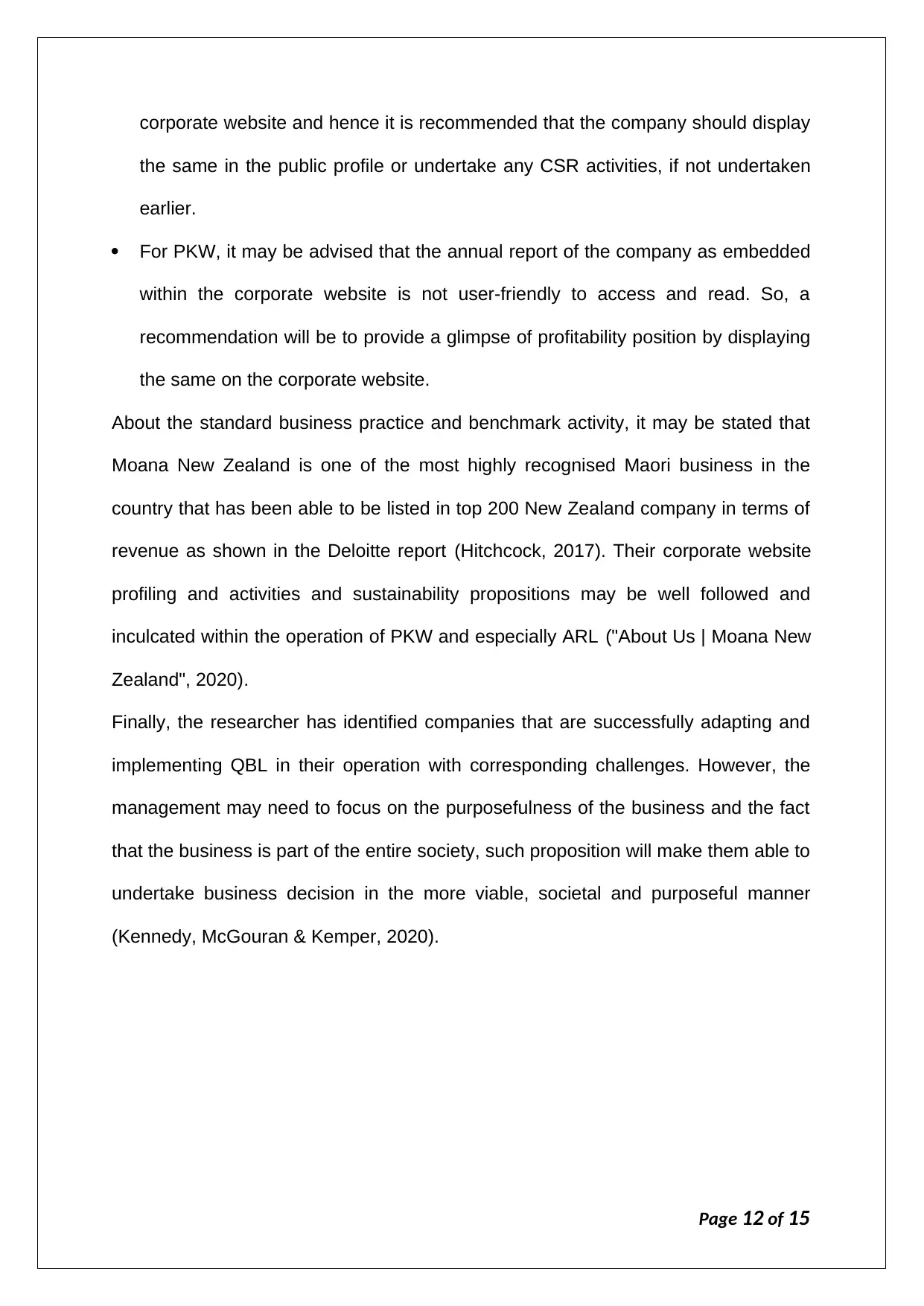
corporate website and hence it is recommended that the company should display
the same in the public profile or undertake any CSR activities, if not undertaken
earlier.
For PKW, it may be advised that the annual report of the company as embedded
within the corporate website is not user-friendly to access and read. So, a
recommendation will be to provide a glimpse of profitability position by displaying
the same on the corporate website.
About the standard business practice and benchmark activity, it may be stated that
Moana New Zealand is one of the most highly recognised Maori business in the
country that has been able to be listed in top 200 New Zealand company in terms of
revenue as shown in the Deloitte report (Hitchcock, 2017). Their corporate website
profiling and activities and sustainability propositions may be well followed and
inculcated within the operation of PKW and especially ARL ("About Us | Moana New
Zealand", 2020).
Finally, the researcher has identified companies that are successfully adapting and
implementing QBL in their operation with corresponding challenges. However, the
management may need to focus on the purposefulness of the business and the fact
that the business is part of the entire society, such proposition will make them able to
undertake business decision in the more viable, societal and purposeful manner
(Kennedy, McGouran & Kemper, 2020).
Page 12 of 15
the same in the public profile or undertake any CSR activities, if not undertaken
earlier.
For PKW, it may be advised that the annual report of the company as embedded
within the corporate website is not user-friendly to access and read. So, a
recommendation will be to provide a glimpse of profitability position by displaying
the same on the corporate website.
About the standard business practice and benchmark activity, it may be stated that
Moana New Zealand is one of the most highly recognised Maori business in the
country that has been able to be listed in top 200 New Zealand company in terms of
revenue as shown in the Deloitte report (Hitchcock, 2017). Their corporate website
profiling and activities and sustainability propositions may be well followed and
inculcated within the operation of PKW and especially ARL ("About Us | Moana New
Zealand", 2020).
Finally, the researcher has identified companies that are successfully adapting and
implementing QBL in their operation with corresponding challenges. However, the
management may need to focus on the purposefulness of the business and the fact
that the business is part of the entire society, such proposition will make them able to
undertake business decision in the more viable, societal and purposeful manner
(Kennedy, McGouran & Kemper, 2020).
Page 12 of 15
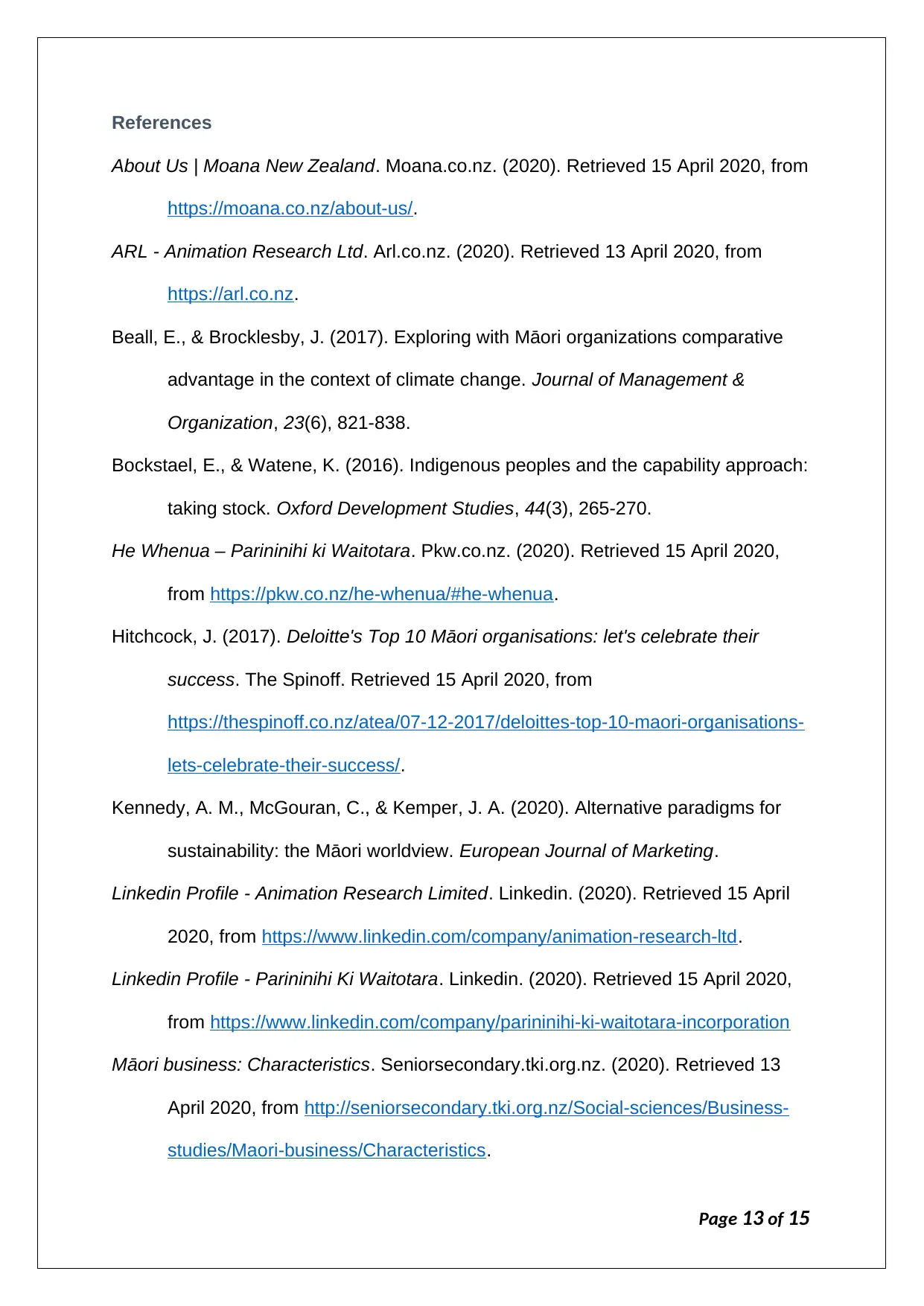
References
About Us | Moana New Zealand. Moana.co.nz. (2020). Retrieved 15 April 2020, from
https://moana.co.nz/about-us/.
ARL - Animation Research Ltd. Arl.co.nz. (2020). Retrieved 13 April 2020, from
https://arl.co.nz.
Beall, E., & Brocklesby, J. (2017). Exploring with Māori organizations comparative
advantage in the context of climate change. Journal of Management &
Organization, 23(6), 821-838.
Bockstael, E., & Watene, K. (2016). Indigenous peoples and the capability approach:
taking stock. Oxford Development Studies, 44(3), 265-270.
He Whenua – Parininihi ki Waitotara. Pkw.co.nz. (2020). Retrieved 15 April 2020,
from https://pkw.co.nz/he-whenua/#he-whenua.
Hitchcock, J. (2017). Deloitte's Top 10 Māori organisations: let's celebrate their
success. The Spinoff. Retrieved 15 April 2020, from
https://thespinoff.co.nz/atea/07-12-2017/deloittes-top-10-maori-organisations-
lets-celebrate-their-success/.
Kennedy, A. M., McGouran, C., & Kemper, J. A. (2020). Alternative paradigms for
sustainability: the Māori worldview. European Journal of Marketing.
Linkedin Profile - Animation Research Limited. Linkedin. (2020). Retrieved 15 April
2020, from https://www.linkedin.com/company/animation-research-ltd.
Linkedin Profile - Parininihi Ki Waitotara. Linkedin. (2020). Retrieved 15 April 2020,
from https://www.linkedin.com/company/parininihi-ki-waitotara-incorporation
Māori business: Characteristics. Seniorsecondary.tki.org.nz. (2020). Retrieved 13
April 2020, from http://seniorsecondary.tki.org.nz/Social-sciences/Business-
studies/Maori-business/Characteristics.
Page 13 of 15
About Us | Moana New Zealand. Moana.co.nz. (2020). Retrieved 15 April 2020, from
https://moana.co.nz/about-us/.
ARL - Animation Research Ltd. Arl.co.nz. (2020). Retrieved 13 April 2020, from
https://arl.co.nz.
Beall, E., & Brocklesby, J. (2017). Exploring with Māori organizations comparative
advantage in the context of climate change. Journal of Management &
Organization, 23(6), 821-838.
Bockstael, E., & Watene, K. (2016). Indigenous peoples and the capability approach:
taking stock. Oxford Development Studies, 44(3), 265-270.
He Whenua – Parininihi ki Waitotara. Pkw.co.nz. (2020). Retrieved 15 April 2020,
from https://pkw.co.nz/he-whenua/#he-whenua.
Hitchcock, J. (2017). Deloitte's Top 10 Māori organisations: let's celebrate their
success. The Spinoff. Retrieved 15 April 2020, from
https://thespinoff.co.nz/atea/07-12-2017/deloittes-top-10-maori-organisations-
lets-celebrate-their-success/.
Kennedy, A. M., McGouran, C., & Kemper, J. A. (2020). Alternative paradigms for
sustainability: the Māori worldview. European Journal of Marketing.
Linkedin Profile - Animation Research Limited. Linkedin. (2020). Retrieved 15 April
2020, from https://www.linkedin.com/company/animation-research-ltd.
Linkedin Profile - Parininihi Ki Waitotara. Linkedin. (2020). Retrieved 15 April 2020,
from https://www.linkedin.com/company/parininihi-ki-waitotara-incorporation
Māori business: Characteristics. Seniorsecondary.tki.org.nz. (2020). Retrieved 13
April 2020, from http://seniorsecondary.tki.org.nz/Social-sciences/Business-
studies/Maori-business/Characteristics.
Page 13 of 15
Paraphrase This Document
Need a fresh take? Get an instant paraphrase of this document with our AI Paraphraser
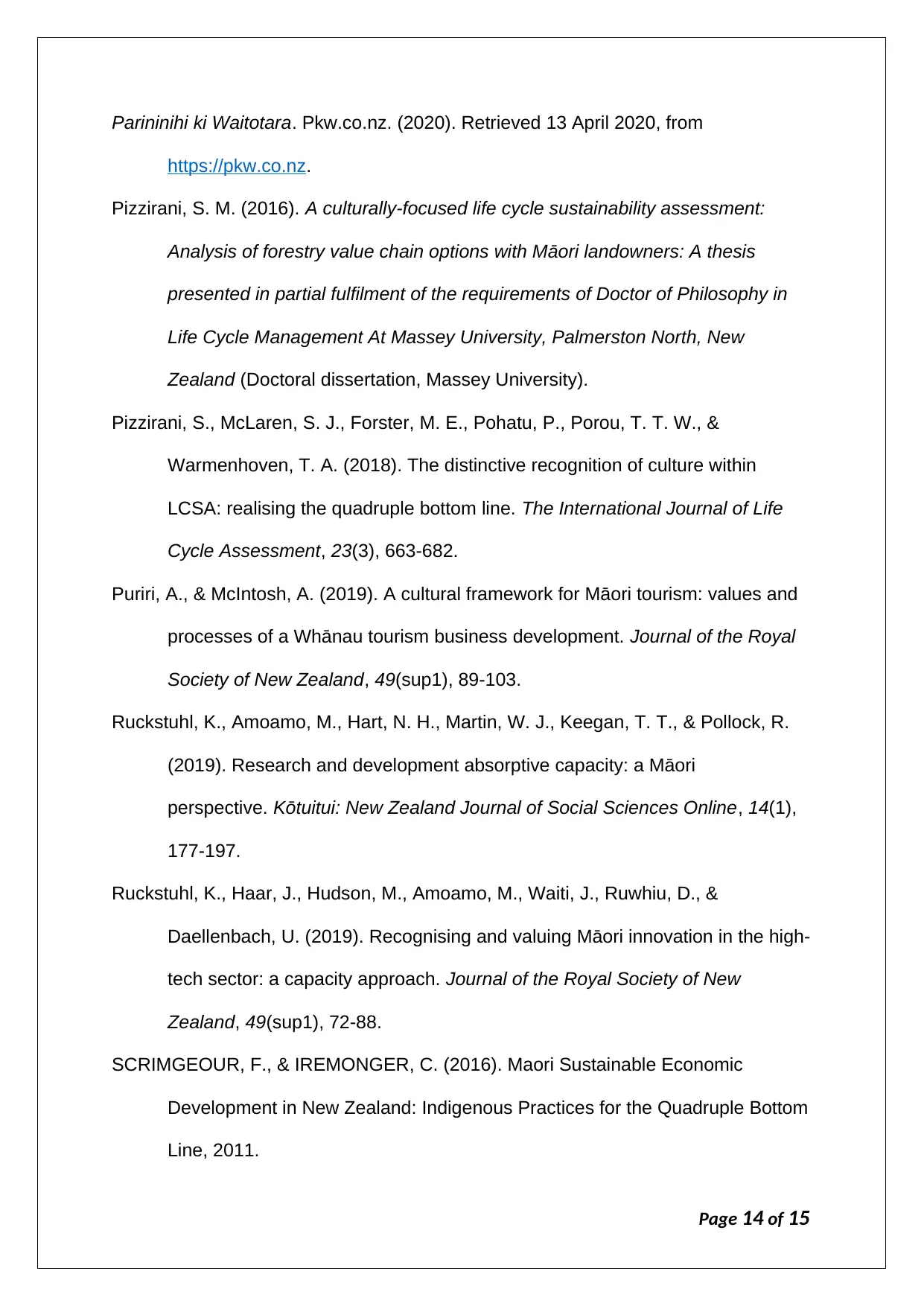
Parininihi ki Waitotara. Pkw.co.nz. (2020). Retrieved 13 April 2020, from
https://pkw.co.nz.
Pizzirani, S. M. (2016). A culturally-focused life cycle sustainability assessment:
Analysis of forestry value chain options with Māori landowners: A thesis
presented in partial fulfilment of the requirements of Doctor of Philosophy in
Life Cycle Management At Massey University, Palmerston North, New
Zealand (Doctoral dissertation, Massey University).
Pizzirani, S., McLaren, S. J., Forster, M. E., Pohatu, P., Porou, T. T. W., &
Warmenhoven, T. A. (2018). The distinctive recognition of culture within
LCSA: realising the quadruple bottom line. The International Journal of Life
Cycle Assessment, 23(3), 663-682.
Puriri, A., & McIntosh, A. (2019). A cultural framework for Māori tourism: values and
processes of a Whānau tourism business development. Journal of the Royal
Society of New Zealand, 49(sup1), 89-103.
Ruckstuhl, K., Amoamo, M., Hart, N. H., Martin, W. J., Keegan, T. T., & Pollock, R.
(2019). Research and development absorptive capacity: a Māori
perspective. Kōtuitui: New Zealand Journal of Social Sciences Online, 14(1),
177-197.
Ruckstuhl, K., Haar, J., Hudson, M., Amoamo, M., Waiti, J., Ruwhiu, D., &
Daellenbach, U. (2019). Recognising and valuing Māori innovation in the high-
tech sector: a capacity approach. Journal of the Royal Society of New
Zealand, 49(sup1), 72-88.
SCRIMGEOUR, F., & IREMONGER, C. (2016). Maori Sustainable Economic
Development in New Zealand: Indigenous Practices for the Quadruple Bottom
Line, 2011.
Page 14 of 15
https://pkw.co.nz.
Pizzirani, S. M. (2016). A culturally-focused life cycle sustainability assessment:
Analysis of forestry value chain options with Māori landowners: A thesis
presented in partial fulfilment of the requirements of Doctor of Philosophy in
Life Cycle Management At Massey University, Palmerston North, New
Zealand (Doctoral dissertation, Massey University).
Pizzirani, S., McLaren, S. J., Forster, M. E., Pohatu, P., Porou, T. T. W., &
Warmenhoven, T. A. (2018). The distinctive recognition of culture within
LCSA: realising the quadruple bottom line. The International Journal of Life
Cycle Assessment, 23(3), 663-682.
Puriri, A., & McIntosh, A. (2019). A cultural framework for Māori tourism: values and
processes of a Whānau tourism business development. Journal of the Royal
Society of New Zealand, 49(sup1), 89-103.
Ruckstuhl, K., Amoamo, M., Hart, N. H., Martin, W. J., Keegan, T. T., & Pollock, R.
(2019). Research and development absorptive capacity: a Māori
perspective. Kōtuitui: New Zealand Journal of Social Sciences Online, 14(1),
177-197.
Ruckstuhl, K., Haar, J., Hudson, M., Amoamo, M., Waiti, J., Ruwhiu, D., &
Daellenbach, U. (2019). Recognising and valuing Māori innovation in the high-
tech sector: a capacity approach. Journal of the Royal Society of New
Zealand, 49(sup1), 72-88.
SCRIMGEOUR, F., & IREMONGER, C. (2016). Maori Sustainable Economic
Development in New Zealand: Indigenous Practices for the Quadruple Bottom
Line, 2011.
Page 14 of 15
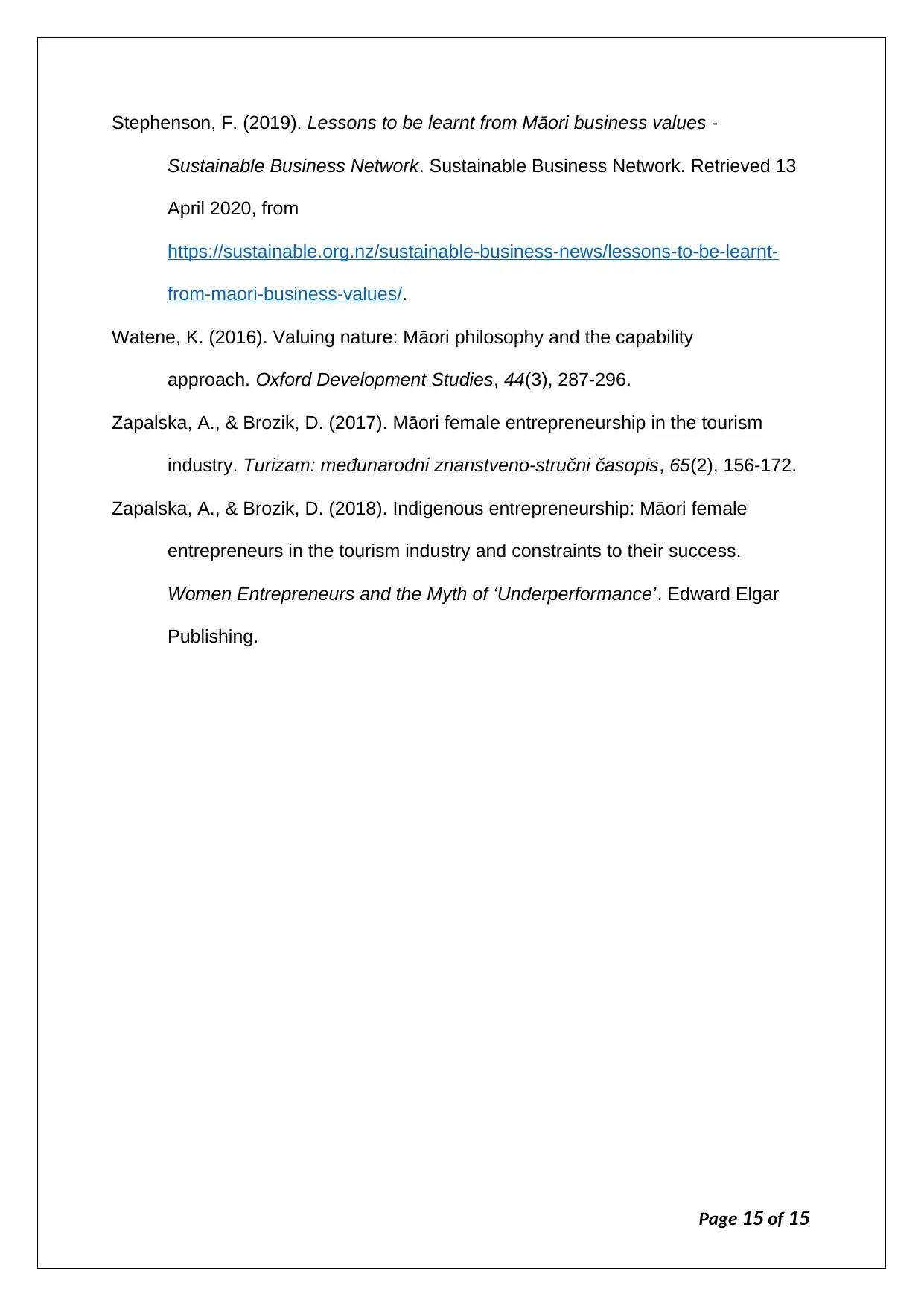
Stephenson, F. (2019). Lessons to be learnt from Māori business values -
Sustainable Business Network. Sustainable Business Network. Retrieved 13
April 2020, from
https://sustainable.org.nz/sustainable-business-news/lessons-to-be-learnt-
from-maori-business-values/.
Watene, K. (2016). Valuing nature: Māori philosophy and the capability
approach. Oxford Development Studies, 44(3), 287-296.
Zapalska, A., & Brozik, D. (2017). Māori female entrepreneurship in the tourism
industry. Turizam: međunarodni znanstveno-stručni časopis, 65(2), 156-172.
Zapalska, A., & Brozik, D. (2018). Indigenous entrepreneurship: Māori female
entrepreneurs in the tourism industry and constraints to their success.
Women Entrepreneurs and the Myth of ‘Underperformance’. Edward Elgar
Publishing.
Page 15 of 15
Sustainable Business Network. Sustainable Business Network. Retrieved 13
April 2020, from
https://sustainable.org.nz/sustainable-business-news/lessons-to-be-learnt-
from-maori-business-values/.
Watene, K. (2016). Valuing nature: Māori philosophy and the capability
approach. Oxford Development Studies, 44(3), 287-296.
Zapalska, A., & Brozik, D. (2017). Māori female entrepreneurship in the tourism
industry. Turizam: međunarodni znanstveno-stručni časopis, 65(2), 156-172.
Zapalska, A., & Brozik, D. (2018). Indigenous entrepreneurship: Māori female
entrepreneurs in the tourism industry and constraints to their success.
Women Entrepreneurs and the Myth of ‘Underperformance’. Edward Elgar
Publishing.
Page 15 of 15
1 out of 15
Related Documents
Your All-in-One AI-Powered Toolkit for Academic Success.
+13062052269
info@desklib.com
Available 24*7 on WhatsApp / Email
![[object Object]](/_next/static/media/star-bottom.7253800d.svg)
Unlock your academic potential
© 2024 | Zucol Services PVT LTD | All rights reserved.




